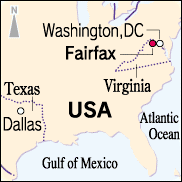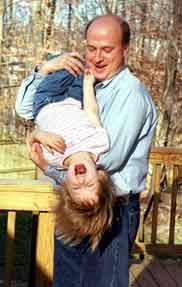April 14, 2000
| Pursuing the causes Seeking compensation from the government |
On a veranda behind his house in Fairfax, Virginia, surrounded by beautiful broadleaf trees, Paul Sullivan (37) romps with his only daughter, Erin (4).
"I've been so busy these days with the House hearings, testifying at the Academy of Science, and all the rest. The best way I have of releasing the stress is playing with my daughter like this on Sundays." As he speaks, he hands his daughter over to his wife, Danielle (34), then sits in a chair next to me.
Sullivan is executive director of the National Gulf War Resource Center (NGWRC), an organization comprising about sixty related organizations throughout the US. His office is about 40 kilometers (about 25 miles) east of his home, in the basement of an office building in downtown Washington, DC. "We have one staff member-me. I do everything from lobbying Congress to taking out the mail," he says with a smile.
The center was founded in March 1995. Sullivan and other soldiers who took part in the Gulf War were suffering from chronic respiratory infections and other medical problems. As their numbers grew, groups of veterans and family members around the US felt the need for a central organization to facilitate exchanges of information and provide moral support. They first linked up informally via the Internet, then, five years ago, about 200 people got together in Dallas, Texas, to launch the NGWRC.
"The US dropped the first atomic bombs on Hiroshima and Nagasaki. Then, during the East-West Cold War, we conducted atmospheric nuclear tests in the Pacific and at the Nevada test site through the 1940s and into the early 60s. In this process, we created more than 250 thousand 'atomic soldiers.' Now, we've used a new radiological weapon in the Gulf War and Kosovo." Sullivan is harshly critical of US nuclear policies that have exposed and sacrificed so many ordinary citizens around the world, including thousands of US soldiers.
America's "atomic soldiers" were given no warning whatsoever about the effects of radiation on the human body. "Even as they struggled with failing health, they were bound by 'top secrecy' and couldn't even tell their families about the experiment they took part in." Winning compensation for US soldiers who were exposed to radiation and later contracted certain types of cancer took over 40 years. More than 20 years were required to get compensation for those exposed to defoliants during the Vietnam War.
"We learned a lot from those earlier struggles. Seven years after the Gulf War, we got a law passed called the 1998 Gulf War Veterans Law, which provides for free medical treatment at veterans hospitals and financial compensation for illness and disability." Sullivan and the NGWRC see this law as "a step forward."
When 100% compensation is approved, the new law provides for an income of about $25,000 a year. Very few get that much, however, and all cases seeking to establish a causal relationship between an illness and radiation or heavy metal poisoning from depleted uranium have been rejected.
"The Pentagon's intention is clear," says Sullivan. "DU munitions are extremely effective against tanks, and the military intends to keep using them. They also intend to sell them overseas. That means profit for the weapons manufacturers, and the military benefits by getting rid of U-238, which is a radioactive waste product."
However, recent experiments with animals are revealing the effects of DU. It has also become clear that DU projectiles can contain trace amounts of plutonium, a deadly toxin. One by one, the facts are emerging from materials that Sullivan and his associates find through the Freedom of Information Act.
"We will continue to press the government to identify the causes of these diseases. Doing so will not only improve treatment and compensation for the veterans and their families, it will lead eventually to the abolition of these inhumane weapons."
Sullivan and those he represents are determined and persistent. Refusing to accept the government's vague pseudo-answers, they are doggedly pursuing the truth. Their fight is an effort to correct fundamental contradictions that plague the world's greatest military power; it is also a fight for justice and democracy.
=Part 1 end=
| Give us your feedback: FAX: 81-82-295-3800 |

